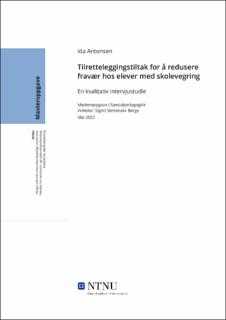Tilretteleggingstiltak for å redusere fravær hos elever med skolevegring
Master thesis
Date
2022Metadata
Show full item recordCollections
- Institutt for lærerutdanning [3411]
Abstract
Formålet med masteroppgaven er å se på fenomenet skolevegring og hvilke tilretteleggingstiltak som er virkningsfulle for å redusere fraværet hos elever med skolevegring. Jeg har intervjuet spesialpedagogiske rådgivere på ungdomsskoler som har delt sine erfaringer om skolens arbeid med å tilrettelegge for elever med skolevegring. Spesialpedagogiske rådgivere har det overordnede spesialpedagogiske ansvaret på skolen og har derfor oversikt over tidligere arbeid som er gjort med å tilrettelegge.
Problemstillingen som belyses i oppgaven er: Hvilke tilretteleggingstiltak opplever spesialpedagoger som virkningsfulle for å redusere fraværet hos elever med skolevegring?
Masteroppgaven er en kvalitativ studie og metoden for å innhente datamaterialet er semistrukturert intervju. Mitt utvalg av informanter består av fem spesialpedagogiske rådgivere på fem ulike ungdomsskoler. Alle ungdomsskolene befinner seg i Trøndelag. Gjennom intervjuene fikk jeg et godt innblikk i informantenes erfaringer, tanker og refleksjoner rundt fenomenet skolevegring og virkningsfulle tiltak for å redusere fravær hos elever med skolevegring. Datamaterialet ble analysert gjennom en tematisk analyse og gjennom analysen dannet jeg tre kategorier: Lærerens betydning, organisering av skoledagen og tverrfaglig samarbeid.
Studien viser at mine informanter hadde god kunnskap om fenomenet skolevegring og hvilke tiltak som kan være virkningsfulle å sette inn. Funnene i studien viser at læreren har en betydning med tanke på tiltak for å redusere fraværet. Dette fordi læreren kan oppdage fraværet tidlig og dermed sette inn tidlige tiltak, noe som er vist gjennom litteraturen at er viktig. Læreren har også et ansvar for å skape en god lærer-elev-relasjon og for å legge til rette for at eleven opplever mestring i skolehverdagen. Studien viser også at skolen kan gjøre organisatoriske tilpasninger, som å strukturere skoledagen, justere timeplan og gjøre oppstarten av dagen enklere ved å møte elevene. Et siste funn i studien er at samarbeid med miljøet rundt og med eleven er viktig. Med tanke på alle tiltak som kan settes inn er et funn i studien at elever med skolevegring er en heterogen gruppe, elevene er ulike og tiltakene som er virkningsfulle vil være ulike. Tiltakene må derfor ta utgangspunkt i elevene og deres forutsetning. Studien gir derfor et innblikk i tiltak som kan settes inn, men det vil ikke være tiltak som vil passe alle elever.
Studien viser at nøkkelen i arbeidet med å redusere fraværet hos elever med skolevegring vil være å skape en dialog med eleven slik at skolen kan tilrettelegges for elevens opplevelse av mestring. Elevens mestringsforventning er en sentral del av studien. Alle skolevegringssaker er ulike, og tiltakene må derfor være individuelt tilpasset hver enkelt elev. The purpose of the master´s thesis is to look at the phenomenon of school refusal and which facilitation measures are effective in reducing the absence of students with school refusal. I have interviewed special education counselors in upper secondary schools who have shared their experiences of the school's work to help students with school refusal. Special education advisers have the overall special education responsibility at the school and therefore have an overview of earlier work that has been done to help.
The research question in this study is: What facilitation measures do special educators find effective in reducing the absence of students with school refusal?
The master's thesis is a qualitative study and the method for obtaining the data material is a semi-structured interview. My choice of informants consists of five special education counselors at five different secondary schools. All upper secondary schools are located in Trøndelag. Through the interviews, I gained a good insight into the informants' experiences, thoughts and reflections on the phenomenon of school refusal and effective measures to reduce absenteeism among students with school refusal. The data material was analyzed through a thematic analysis and through the analysis I formed three categories: the importance of the teacher, organizing the school day and interdisciplinary collaboration.
The study shows that my informants had good knowledge of the phenomenon of school refusal and what measures can be effective to implement. The findings of the study show that the teacher is important in terms of measures to reduce absenteeism. This is because the teacher can detect the absence early and thus take early intervention, which has been shown through the literature to be important. The teacher also has a responsibility to create a good teacher-student relationship and to help the student experience self-efficacy in everyday school life. The study also shows the school can make organizational adjustments, such as structuring the school days, adjusting the schedule, and making the start of the day easier by meeting the students. A recent finding in the study is that cooperation with the environment around and including the student is important. Regarding all measures that can be implemented, one finding in the study is that students with school refusal are a heterogeneous group, the students are different and the measures that are effective will be different. The measures must therefore be based on the students and their prerequisites. The study therefore supplies an insight into measures that can be implemented, but there will not be measures that will suit all students.
The study shows that the key to reducing absenteeism among students with school refusal will be to create a dialogue with the student so that the school can be adapted for the student's experience of self-efficacy. The student's expectation of self-efficacy is a central part of the study. All school refusal cases are different, and the measures must therefore be individually adapted to each individual student.
